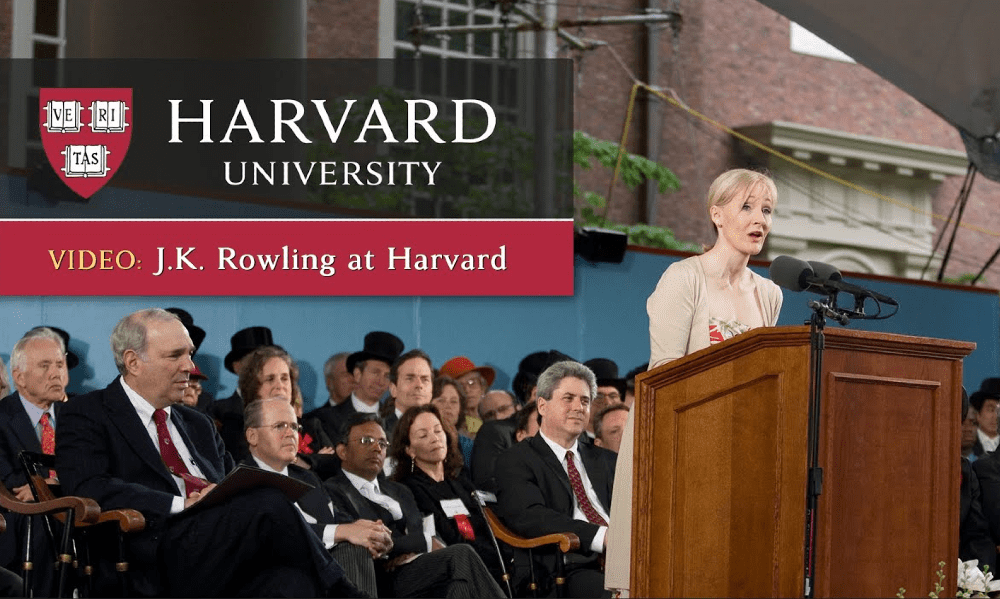The best graduation speeches are inspiring and encouraging, and gifted commencement speakers can balance gravity with humour. J.K. Rowling, the famed author of the Harry Potter series, makes one of such speakers with her symbolic, memorable address to the 2008 Harvard graduates, where she drew laughter and applause effortlessly across her audience as she delivered two core lessons in her speech about the fringe benefits of failure and the importance of imagination.
The Fringe Benefits of Failure
Most may have known about Rowling’s tough life before her big break. Her rags-to-riches story serve as an inspiration for many. Her transition from a single mum on the verge of bankruptcy to one of the wealthiest authors in the world gives her words complete credibility.
Rowling had studied modern languages and classics in university. Everyone then had the opinion that her choice of education was not offering too many opportunities. Whilst still in school, she was not worried because she always did well in her exams. But as soon as she graduated, she started to fear that she would face failure. Seven years later, this notion was reinforced by her life experiences.
“An exceptionally short-lived marriage had imploded, and I was jobless, a lone parent, and as poor as it is possible to be in modern Britain, without being homeless. The fears that my parents had had for me, and that I had had for myself, had both come to pass, and by every usual standard, I was the biggest failure I knew.”
But it was these failures that led Rowling to her success. She explained that during the darkest time of her life, she was able to strip away what was unimportant and finish only the work that mattered to her.
“I stopped pretending to myself that I was anything other than what I was and began to direct all my energy into finishing the only work that mattered to me. Had I really succeeded at anything else, I might never have found the determination to succeed in the one arena I believed I truly belonged. I was set free, because my greatest fear had been realised, and I was still alive, and I still had a daughter whom I adored, and I had an old typewriter and a big idea. And so rock bottom became the solid foundation on which I rebuilt my life.”
According to Rowling, some disappointment in life is inevitable. “It is impossible to live without failing at something unless you live so cautiously that you might as well not have lived at all—in which case, you fail by default.” Rowling went on to explain that without failure, a person will never truly know themselves or the strength of their relationships until both have been tested by adversity. And these lessons, she said, have been worth more than any qualification she has ever earned.
The Importance of Imagination
It was unsurprising that Rowling would discuss “imagination” in her speech, the one thing that shaped the heart of her writing. But what was interesting was how she defined imagination as a form of power that we humans uniquely own that enables us to empathise with others.
Rowling related her dark experiences in her 20s as an employee at Amnesty International, a non-government organisation focused on human rights, where she learnt by association about “the evils that humankind will inflict on their fellow humans to gain or maintain power.” At the same time, she also bore witness to human kindness, where “ordinary people” blessed with the security of their well-being join together to “save people they do not know and will never meet.”
That, she said, is the power of human empathy that leads to collective action that can bring about social change. And empathy stems from our natural ability to exercise our imagination, learn and understand others’ plight without having experienced it, feel the emotions of others as though they are our own, and think ourselves in other people’s places.
She cautioned that if we choose to remain comfortably within the bounds of our own experience and not try to empathise and imagine what the world is like for someone else, then we shall “enable real monsters”. That means that when we do nothing for a situation, we allow it to continue.
With that, the novelist urged graduates to use their status and influence to raise their voices “on behalf of those who have no voice,” to “identify with not only with the powerful but with the powerless,” and to “retain the ability to imagine (themselves) into the lives of those who do not have (their) advantages.” And when we can succeed at that, we not only make our families proud, but we also help change the reality of “thousands and millions of people.”
“We do not need magic to change the world;
we carry all the power we need inside ourselves already:
we have the power to imagine better.”
Rowling has left the world a magical legacy, and we can do the same. We are undoubtedly a revolutionary generation. Let us all develop our imagination to create a better world. And may we not fear failure and confront the darker bits of our lives, learning from our disappointments and having the grit to bounce back stronger.

